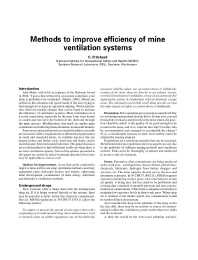Mining Publication: Methods to Improve Efficiency of Mine Ventilation Systems
Original creation date: January 2010
There are many things that can be done to improve airflow in the mine. What is needed is to look around, inquire, measure and understand. Actions to dilute contaminants and improve the working environment will result in a healthier, happier workforce and most likely improved production and lower turnover. This paper has discussed some ways to find extra usable air when there is no extra ventilation capacity. If there is adequate air, then the option is to implement some of these changes and reduce expenditures through lowering operating costs. Since airflow power is proportional to velocity cubed (Marx 2008) the first fan blade setting reduction is the biggest savings. Don't forget, each cfm saved doesn't have to be heated or cooled either (Hall, 1985). Remember to take the entire system into account. Develop and utilize a good computer model. All changes have consequences, so be sure to perform a risk analysis and determine the effects on emergency and evacuation planning.
Authors: CJ Pritchard
Peer Reviewed Journal Article - January 2010
NIOSHTIC2 Number: 20036396
Trans Soc Min Metal Explor 2010 Jan; 326:34-38
See Also
- Atmospheric Monitoring
- CO and CO2 Emissions from Spontaneous Heating of Coal Under Different Ventilation Rates
- Experimental and Modeling Investigation of the Effect of Ventilation on Smoke Rollback in a Mine Entry
- Investigation into the Practical Use of Belt Air at US Longwall Operations
- Maximizing the Ventilation of Large-Opening Mines
- Methods to Improve Mine Ventilation System Efficiency
- Novel Stopping Designs for Large-Opening Metal/Nonmetal Mines
- Sulfur Hexafluoride as a Mine Ventilation Research Tool - Recent Field Applications
- Technology News 519 - EZ-Up Curtain Stoppings: A Practical Solution for Directing Ventilation Airflows in Large-opening Metal/Nonmetal Mines
- Using Ultrasonic Anemometers to Evaluate Face Ventilation Conditions
- Content source: National Institute for Occupational Safety and Health, Mining Program


 ShareCompartir
ShareCompartir
